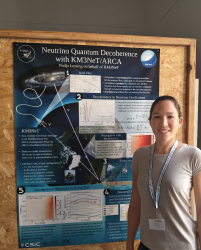A predoctoral researcher from IFIC awarded Best Poster Prize by the European Physical Society at the PhD MAJORANA School
Predoctoral researcher Nadja Lessing, a member of the Institute for Corpuscular Physics (IFIC), a joint center of the Spanish National Research Council (CSIC) and the University of Valencia, has been awarded the EPS Poster Prize, granted by the European Physical Society (EPS) during the PhD School ‘Ettore Majorana’ of Nuclear, Subnuclear and Astroparticle Physics, held from July 11 to 20, 2025, in Erice, Italy.
The award-winning work was presented in poster format and is part of the doctoral thesis that the researcher is developing at IFIC under the supervision of Rebecca Gozzini and Alfonso García Soto, both researchers in the VEGA group (Valencia Experimental Group on Astroparticle Physics) at IFIC. “I put a lot of effort into preparing the poster to visualize the framework of my research, and I’m glad that work has been appreciated,” says Nadja. “Winning the prize is an extra motivation to keep working hard on communicating my research.”
Nadja Lessing’s research project focuses on the search for possible effects of quantum decoherence in neutrinos, a phenomenon that could arise in theories extending the Standard Model, such as certain quantum gravity scenarios. The study is conducted using the ARCA detector, part of the KM3NeT experiment, located on the seabed of the Mediterranean Sea and optimized for the detection of high-energy neutrinos through the observation of Cherenkov light. Cherenkov radiation is a type of electromagnetic radiation produced when electrically charged particles travel through a medium at speeds greater than the speed of light in that medium. While nothing can exceed the speed of light in a vacuum, light can travel slower in other media—so when a particle surpasses that speed in a given medium, we observe Cherenkov radiation.
The analysis uses atmospheric neutrino fluxes reconstructed as track-like events, typically associated with a type of neutrino called “muon neutrinos.” To distinguish these events from the dominant background of atmospheric muons, machine learning techniques are employed—specifically, optimized decision trees. Simulations make it possible to compare the expected evolution of the neutrino flux under the standard oscillation framework with scenarios that include decoherence effects, revealing characteristic differences that could represent an observable signature of the phenomenon.
The PhD MAJORANA school is organized by INFN (Istituto Nazionale di Fisica Nucleare, based in Rome, Italy) and is one of the most relevant advanced training events in the field of particle and nuclear physics. Aimed at PhD students from around the world, the school combines lectures by international experts with hands-on sessions and scientific presentations by the students.
The award for best poster, sponsored by the EPS, recognizes scientific quality, clarity of presentation, and the potential impact of the work presented. “I also interpret it as a sign that the questions we’re trying to answer in our research group are sparking interest in the scientific community,” concludes Lessing. Her participation and the recognition she received reflect IFIC’s commitment to training young researchers and fostering emerging talent.



















